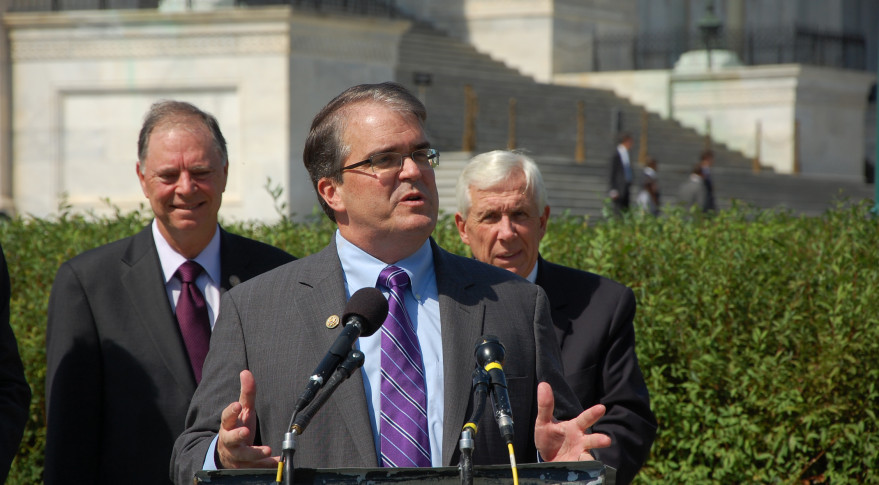House Bill Offers Same Funding But Different Priorities for NASA

WASHINGTON — A House appropriations subcommittee approved a spending bill May 14 that fully funds the Obama administration's overall request for NASA, but cuts funding from commercial crew and space technology and adds it to the Space Launch System and planetary science.
The House Appropriations commerce, justice, science subcommittee approved its 2016 spending bill on a voice vote May 14, sending it on to the full committee for consideration. The $51.4 billion bill funds the Departments of Commerce and Justice, NASA, and the National Science Foundation.
The bill provides NASA with $18.529 billion for 2016, the same overall amount requested by the White House in its budget proposal in February. However, the bill moves funding among the agency's programs compared to the original proposal.
The biggest changes are in NASA's exploration systems account, for which the bill provides $4.759 billion, an increase of $253 million over the request. The bill allocates $1.85 billion for SLS, nearly $550 million more than requested. It funds Orion and exploration ground systems at the requested levels of $1.096 billion and $410 million respectively.
Commercial crew, though, would be cut, receiving $1 billion, $243 million less than administration's request. Exploration research and development would also be cut by nearly $50 million from the request, to $350 million.
"We have done as much as we can in this bill, within the limits set on us by the Budget Control Act, to ensure that we get our manned space program back into space as quickly as humanly possible," said subcommittee chairman Rep. John Culberson (R-Texas) at the May 14 markup, discussing the funding for SLS and Orion in the bill.
The bill's funding for SLS and commercial crew, though, is at odds with guidance provided by NASA. In congressional hearings in April, NASA Administrator Charles Bolden said that giving SLS more money than requested would not accelerate the vehicle's first launch, currently planned for 2018. He also warned that cuts in the commercial crew program would force NASA to renegotiate existing contracts with Boeing and SpaceX and delay the completion of their spacecraft beyond 2017.
Get the Space.com Newsletter
Breaking space news, the latest updates on rocket launches, skywatching events and more!
The other NASA program to get a major cut is space technology. That program gets $625 million in the bill, nearly $100 million below the administration's request. Space operations, construction, and safety, security, and mission services receive smaller cuts in the House bill.
The House bill reduced the requested $5.29 billion for NASA science by $51 million. The bill does not discuss how that funding is allocated among NASA's science divisions, but a statement from the committee accompanying the bill states that it includes funding above the administration's request of $1.36 billion for planetary sciences. That likely means larger cuts in other divisions, such as Earth sciences.
The bill does specify that $140 million of the NASA science funding should go to work on a mission to Jupiter's icy moon Europa, specifying that the spacecraft launch on an SLS no later than 2022. NASA, which requested only $30 million for a Europa mission in its budget proposal, has yet to decide on a launch vehicle for the mission and has been planning a launch in the mid-2020s.
The bill also includes language similar to past appropriations restricting NASA, along with the Office of Science and Technology Policy, from bilateral cooperation with China. The bill includes exceptions for meetings that do not involve the transfer of sensitive information and do not include any Chinese officials known to have been involved in human rights violations, provided Congress is notified at least 30 days in advance.
The committee is expected to release the report accompanying the bill, with more information about spending allocations within NASA programs and other policy provisions, before the full committee takes up the bill. That full committee markup is expected as soon as the week of May 18.
Any CJS appropriations bill the House approves is likely to differ from the Senate's version. While Senate appropriators have not started work on their bill, Sen. Barbara Mikulski (D-Md.), ranking member of both the full appropriations committee and its CJS subcommittee, said recently she would seek an increase over the administration's request for NASA.
"Although I appreciated what the President advised, I found that the funding for the space program needed to be more robust," she said in an April 27 speech to the Maryland Space Business Roundtable.
Culberson, at the May 14 markup, also lamented that he could not provide more funding. "NASA is not where it needs to be," he said. "In the years ahead we're going to work hard to get more money."
This story was provided by SpaceNews, dedicated to covering all aspects of the space industry.
Join our Space Forums to keep talking space on the latest missions, night sky and more! And if you have a news tip, correction or comment, let us know at: community@space.com.

Jeff Foust is a Senior Staff Writer at SpaceNews, a space industry news magazine and website, where he writes about space policy, commercial spaceflight and other aerospace industry topics. Jeff has a Ph.D. in planetary sciences from the Massachusetts Institute of Technology and earned a bachelor's degree in geophysics and planetary science from the California Institute of Technology. You can see Jeff's latest projects by following him on Twitter.
